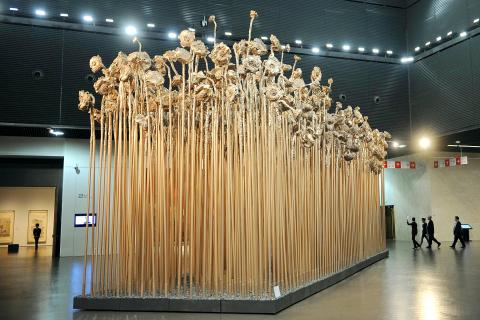Shanghai yesterday opened two new art museums on the former site of the 2010 World Expo, as China’s commercial hub seeks to rival art capitals like New York and Paris.
The China Art Museum, intended to be Shanghai’s premier showplace for modern art, threw open its doors in the former China pavilion, which was the signature building for the world’s fair.
“The scale and configuration is matchless in Asia. It is close to America’s Metropolitan Museum of Art, France’s Musee d’Orsay and other internationally famous art museums,” Shanghai Municipal Administration of Cultural, Radio, Film and Television Director Hu Jinjun (胡勁軍) said before the opening.

Phtto: AFP
The government-backed museum has an exhibition space alone of 64,000m2, Hu told state media.
A new contemporary art museum also welcomed holiday crowds yesterday to exhibit works from the 1980s onwards and give a permanent home to Shanghai’s annual art festival.
Called the “Power Station of Art,” the 40,000m2 museum takes its name from the former power station building that was converted for the Expo.
Critics have raised questions over how Shanghai will fill the massive spaces with meaningful exhibitions.
“They’re basically modeling themselves on New York or London,” said Chris Gill, a Shanghai-based artist and arts writer.
“China tends to build these huge art museums. The problem is what they’re going to put in it. The content side is always compromised by the political situation,” he said.
China censors art that it considers politically sensitive or pornographic, with local officials having the right to pull individual works or shut down shows.
Shanghai officials last month barred display of a photographic work by artist Chi Peng (遲鵬), which shows a gorilla at Beijing’s famed Tiananmen Square, according to his microblog.
In 2006, Shanghai shut down an exhibition by dozens of Chinese artists at a private art museum for showing “pornographic” images, described as pictures of naked women.
The exhibitions in place for the opening of the China Art Museum are heavily weighted toward Chinese art, but one floor has foreign works including a painting by Rembrandt and another by Johannes Vermeer — on loan from the Netherlands’ Rijksmuseum.
Shanghai university student Wang Qingyong marveled at the size of the new museum.
“There is a lot of space. More works will come,” she said gazing at a painting by the US artist Robert Bechtle.
Shanghai has already tested the China Pavilion as a venue for art, spending US$1.4 million for China’s biggest-ever exhibition of the works of Spanish artist Pablo Picasso last year, but attendance was lower than expected.
The city has high hopes for attendance, distributing free tickets for 10,000 people a day to the China Art Museum and 6,000 daily for the Power Station of Art over the week-long National Day holiday, which started yesterday.

In the sweltering streets of Jakarta, buskers carry towering, hollow puppets and pass around a bucket for donations. Now, they fear becoming outlaws. City authorities said they would crack down on use of the sacred ondel-ondel puppets, which can stand as tall as a truck, and they are drafting legislation to remove what they view as a street nuisance. Performances featuring the puppets — originally used by Jakarta’s Betawi people to ward off evil spirits — would be allowed only at set events. The ban could leave many ondel-ondel buskers in Jakarta jobless. “I am confused and anxious. I fear getting raided or even

POLITICAL PATRIARCHS: Recent clashes between Thailand and Cambodia are driven by an escalating feud between rival political families, analysts say The dispute over Thailand and Cambodia’s contested border, which dates back more than a century to disagreements over colonial-era maps, has broken into conflict before. However, the most recent clashes, which erupted on Thursday, have been fueled by another factor: a bitter feud between two powerful political patriarchs. Cambodian Senate President and former prime minister Hun Sen, 72, and former Thai prime minister Thaksin Shinawatra, 76, were once such close friends that they reportedly called one another brothers. Hun Sen has, over the years, supported Thaksin’s family during their long-running power struggle with Thailand’s military. Thaksin and his sister Yingluck stayed

Kemal Ozdemir looked up at the bare peaks of Mount Cilo in Turkey’s Kurdish majority southeast. “There were glaciers 10 years ago,” he recalled under a cloudless sky. A mountain guide for 15 years, Ozdemir then turned toward the torrent carrying dozens of blocks of ice below a slope covered with grass and rocks — a sign of glacier loss being exacerbated by global warming. “You can see that there are quite a few pieces of glacier in the water right now ... the reason why the waterfalls flow lushly actually shows us how fast the ice is melting,” he said.

RESTRUCTURE: Myanmar’s military has ended emergency rule and announced plans for elections in December, but critics said the move aims to entrench junta control Myanmar’s military government announced on Thursday that it was ending the state of emergency declared after it seized power in 2021 and would restructure administrative bodies to prepare for the new election at the end of the year. However, the polls planned for an unspecified date in December face serious obstacles, including a civil war raging over most of the country and pledges by opponents of the military rule to derail the election because they believe it can be neither free nor fair. Under the restructuring, Myanmar’s junta chief Min Aung Hlaing is giving up two posts, but would stay at the